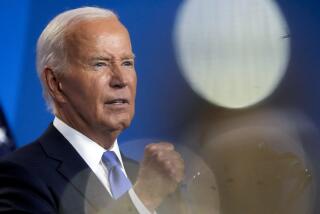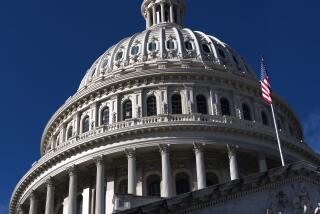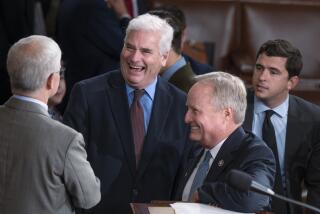POLITICAL BRIEFING
CAMPAIGN ‘92: Both major political parties are pushing to revamp their campaign strategies for 1992 in the wake of the November election.
Democrats, buoyed by their gains in the House following the mid-autumn budget debacle, plan to expand their new “economic fairness” theme in the 102nd Congress. House leaders talk about reintroducing the surtax on millionaires that President Bush fought off during the budget talks--and perhaps using the extra revenues to help finance a reduction in Social Security payroll taxes or other new programs.
Meanwhile, Republicans are pressing the White House to unveil a more aggressive domestic agenda. A Domestic Policy Council task force is exploring proposals for conservative alternatives involving educational choice, tenant ownership of public housing and a new kind of individual retirement account that could be used to finance health-care costs.
RIGHT-WING CHALLENGE?: Bush faces the prospect of increasing political flak from his own party’s right wing--and possibly even a primary challenge in 1992--in the wake of the recent turmoil over the budget and the Persian Gulf.
Burton Yale Pines, senior vice president of the conservative Heritage Foundation, lays out the case for a challenge to Bush in the new issue of the institution’s Policy Review. “Open opposition would allow conservatives to go solidly on record against the betrayals of the Bush Administration,” Pines argues.
Among the potential challenges that White House aides eye most warily is a possible 1992 presidential bid by conservative columnist Patrick J. Buchanan, who has been a vociferous critic of Bush’s policy in the Persian Gulf.
THE CANDIDATES: The consensus at a post-election meeting of Democratic state party leaders: Despite his lackluster reelection victory, New York Gov. Mario M. Cuomo still leads the pack of undeclared candidates for the party’s presidential nomination.
But party chieftains see the possibility of serious competition from three Southern senators--Lloyd Bentsen of Texas, Sam Nunn of Georgia and Albert Gore Jr. of Tennessee. Also regarded as a prospect: Arkansas Gov. Bill Clinton, who might match Cuomo’s strategy of exploiting voter discontent with Washington. Finally, a possible long shot: Nebraska Sen. Bob Kerrey.
Cuomo, who is expected to hold off any announcement until spring in order to deal with his state’s huge budget deficit, will likely face a challenge for the party’s liberal cadre from the Rev. Jesse Jackson and--conceivably--New Jersey Sen. Bill Bradley.
TERM LIMIT? Strategists for the drive to adopt a constitutional amendment limiting congressional terms are counting on a bumper crop of vacant House seats expected in 1992 to bolster their efforts.
Although resistance from incumbent congressmen could be formidable, proponents believe that strong grass-roots support for a term limitation could prod candidates who are competing for open seats to endorse the amendment, whose passage would require approval by two-thirds of both houses of Congress.
The number of vacant seats could run as high as 100--compared with 29 in this year’s election--says a GOP political consultant, Eddie Mahe. The reason: Redistricting, and the desire of many veteran congressmen to take advantage of the statutory deadline for converting surplus campaign funds to their personal use.
More to Read
Get the L.A. Times Politics newsletter
Deeply reported insights into legislation, politics and policy from Sacramento, Washington and beyond. In your inbox three times per week.
You may occasionally receive promotional content from the Los Angeles Times.









